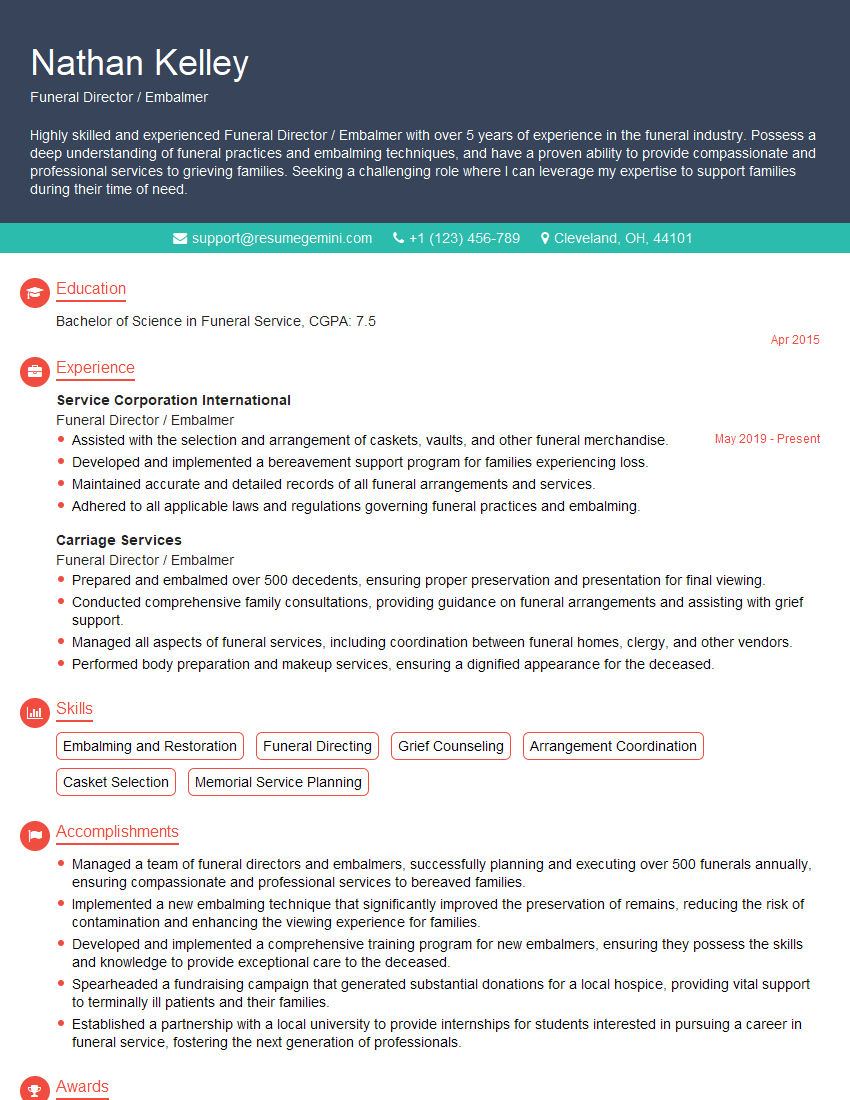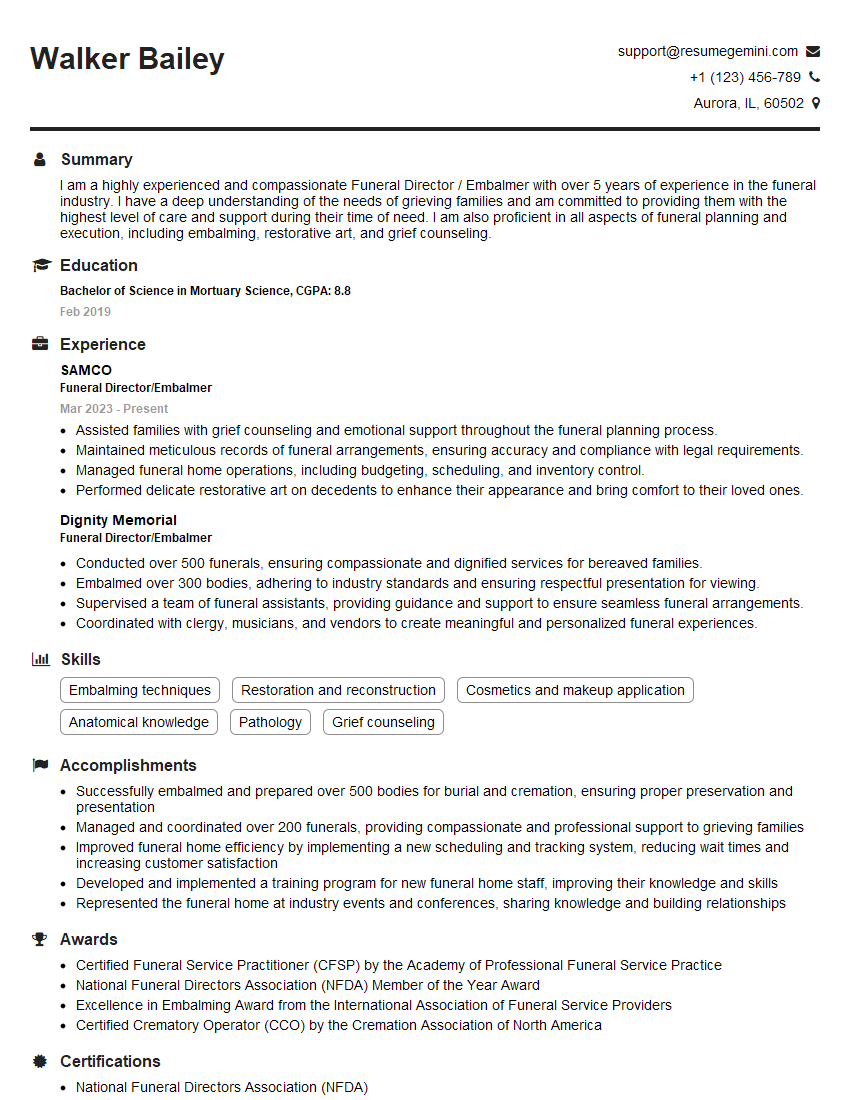Are you gearing up for a career shift or aiming to ace your next interview? Look no further! We’ve curated a comprehensive guide to help you crack the interview for the coveted Funeral Director / Embalmer position. From understanding the key responsibilities to mastering the most commonly asked questions, this blog has you covered. So, buckle up and let’s embark on this journey together
Acing the interview is crucial, but landing one requires a compelling resume that gets you noticed. Crafting a professional document that highlights your skills and experience is the first step toward interview success. ResumeGemini can help you build a standout resume that gets you called in for that dream job.
Essential Interview Questions For Funeral Director / Embalmer
1. Describe the embalming process and explain how you ensure the preservation of the body is done with the utmost respect and care.
- Explain the steps involved in embalming, including cavity treatment, arterial embalming, and cosmetic restoration.
- Describe how you maintain a sterile work environment and follow all safety protocols.
- Explain how you show respect for the deceased and their family during the embalming process.
2. How do you handle situations where the deceased has suffered severe trauma or disfigurement?
Communication and Coordination
- Consult with family members and medical professionals to determine the best course of action.
- Maintain open communication to keep all parties informed and address any concerns.
Restoration Techniques
- Utilize advanced restoration techniques to minimize the visibility of trauma or disfigurement.
- Apply makeup and prosthetics to restore a natural-looking appearance.
Respect for the Deceased
- Treat the deceased with the utmost respect and dignity throughout the process.
- Handle the body with care and avoid causing further damage.
3. How do you manage multiple funeral arrangements simultaneously while ensuring personalized service to each family?
- Prioritize tasks and allocate resources effectively to meet deadlines.
- Maintain clear communication with families to keep them informed and address their needs promptly.
- Delegate responsibilities to team members to ensure efficient coordination.
- Utilize technology to streamline processes and track progress.
4. Describe your experience in preparing bodies for viewing and how you ensure they are presented in a dignified and respectful manner.
- Explain your techniques for dressing and positioning the deceased.
- Describe how you work with families to select clothing and accessories that reflect the deceased’s personality and preferences.
- Explain how you maintain a clean and respectful environment during the preparation process.
5. What is your approach to counseling and supporting grieving families?
Empathy and Understanding
- Demonstrate empathy and understanding toward grieving families.
- Listen attentively to their needs and concerns.
Personalized Support
- Provide personalized support tailored to each family’s unique circumstances.
- Offer guidance and resources to help them cope with their loss.
Professionalism and Respect
- Maintain a professional and respectful demeanor at all times.
- Respect family members’ decisions and choices.
6. How do you handle complaints or concerns from families regarding the funeral services provided?
- Listen attentively to the family’s concerns and acknowledge their feelings.
- Investigate the complaint thoroughly to determine the root cause.
- Communicate openly and honestly with the family about the findings.
- Take appropriate steps to resolve the issue and prevent it from recurring.
7. What are the ethical and legal considerations you take into account when performing your duties as a Funeral Director / Embalmer?
- Adherence to industry regulations and professional codes of conduct.
- Respect for the deceased and their family’s wishes.
- Confidentiality and privacy of sensitive information.
- Transparency and honesty in all dealings with families.
- Proper disposal of hazardous materials and compliance with environmental regulations.
8. How do you stay up-to-date on the latest advancements and trends in the funeral industry?
- Attend industry conferences and workshops.
- Read trade publications and journals.
- Participate in online webinars and discussions.
- Network with other professionals in the field.
- Stay informed about changes in regulations and legislation.
9. How do you balance the demands of your job while maintaining a healthy work-life balance?
- Set clear boundaries between work and personal time.
- Prioritize tasks and delegate responsibilities when possible.
- Take regular breaks and vacations to recharge.
- Seek support from family, friends, or a therapist if needed.
- Maintain a positive attitude and focus on the meaningful aspects of the job.
10. Why are you passionate about working as a Funeral Director / Embalmer?
- Describe your personal values and how they align with the profession.
- Explain how the job allows you to make a meaningful contribution to families in their time of need.
- Share specific experiences that have highlighted your passion for this work.
Interviewers often ask about specific skills and experiences. With ResumeGemini‘s customizable templates, you can tailor your resume to showcase the skills most relevant to the position, making a powerful first impression. Also check out Resume Template specially tailored for Funeral Director / Embalmer.
Career Expert Tips:
- Ace those interviews! Prepare effectively by reviewing the Top 50 Most Common Interview Questions on ResumeGemini.
- Navigate your job search with confidence! Explore a wide range of Career Tips on ResumeGemini. Learn about common challenges and recommendations to overcome them.
- Craft the perfect resume! Master the Art of Resume Writing with ResumeGemini’s guide. Showcase your unique qualifications and achievements effectively.
- Great Savings With New Year Deals and Discounts! In 2025, boost your job search and build your dream resume with ResumeGemini’s ATS optimized templates.
Researching the company and tailoring your answers is essential. Once you have a clear understanding of the Funeral Director / Embalmer‘s requirements, you can use ResumeGemini to adjust your resume to perfectly match the job description.
Key Job Responsibilities
Funeral Directors / Embalmers play a crucial role in providing compassionate care and support to families during difficult times. Their responsibilities span a wide range of tasks, including:
1. Directing Funerals
Funeral Directors oversee all aspects of funeral arrangements, working closely with families to plan and coordinate meaningful services that reflect the wishes of the deceased and their loved ones.
- Advising families on funeral options, including burial and cremation
- Arranging transportation of the deceased
- Scheduling viewings, funerals, and graveside services
2. Embalming and Preparing the Deceased
Embalmers are responsible for preserving and preparing the deceased for burial or cremation. This involves:
- Performing embalming procedures to sanitize and preserve the body
- Applying cosmetics and dressing the deceased for viewing
- Fitting individuals with pacemakers or other medical devices with special precautions
3. Grief Support and Counseling
Funeral Directors / Embalmers provide emotional support and guidance to grieving families. They:
- Offer counseling and support to help families cope with their loss
- Provide resources and referrals to grief support groups and other services
- Maintain a professional and compassionate demeanor, creating a safe and supportive environment
4. Administrative and Business Operations
In addition to their primary duties, Funeral Directors / Embalmers also manage administrative and business operations:
- Maintaining funeral home records and financial accounts
- Marketing and advertising funeral services
- Training and supervising staff
Interview Tips
Preparing thoroughly for an interview for a Funeral Director / Embalmer position is essential to showcase your skills and convey your passion for the profession. Here are some interview tips to help you ace your interview:
1. Research the Funeral Home and Its Culture
Familiarize yourself with the funeral home’s website, social media pages, and any available online reviews. Learn about their history, mission, and the services they offer. This knowledge will demonstrate your interest in the specific organization and its values.
- Check their website for recent obituaries and funeral announcements to understand the types of services they provide.
- Read online reviews to get insights into the funeral home’s reputation and customer satisfaction levels.
2. Practice Your Answers to Common Interview Questions
Anticipate questions that you may be asked during the interview and prepare thoughtful answers. Consider using the STAR method (Situation, Task, Action, Result) to structure your responses and provide specific examples of your skills and experiences.
- For example, when asked about your experience with grief support, you could describe a situation where you provided comfort and guidance to a grieving family, the specific actions you took, and the positive outcome that resulted.
3. Emphasize Your Passion for the Profession
Convey your genuine interest and passion for working as a Funeral Director / Embalmer. Explain what drew you to this profession and highlight any personal experiences or values that align with the role.
- Share any volunteer experiences or community involvement related to grief support or end-of-life care.
- Mention any personal qualities, such as empathy, compassion, and attention to detail, that make you well-suited for the profession.
4. Be Professional and Punctual
Dress professionally and arrive on time for your interview. Maintain a positive and respectful demeanor throughout the process. Your appearance and conduct will reflect your professionalism and commitment to the role.
- Wear dark and formal attire to show respect for the profession.
- Be mindful of your body language, maintain eye contact, and speak clearly and confidently.
Next Step:
Now that you’re armed with the knowledge of Funeral Director / Embalmer interview questions and responsibilities, it’s time to take the next step. Build or refine your resume to highlight your skills and experiences that align with this role. Don’t be afraid to tailor your resume to each specific job application. Finally, start applying for Funeral Director / Embalmer positions with confidence. Remember, preparation is key, and with the right approach, you’ll be well on your way to landing your dream job. Build an amazing resume with ResumeGemini

